Prior post: https://blog.bucksvsbytes.com/2022/12/16/road-trip-europe-22-12-05-the-car/
[NOTE: Some displayed images are automatically cropped. Click or tap any photo (above the caption) to see it in full screen.
From here in Girona to Berlin is almost a 1,200 mile drive, which even for a driving enthusiast like me is too much for one day. I’ve contacted a Servas host in Riedisheim, France. Sounds German, doesn’t it? It is, because this is the part of France that has historically seesawed back and forth to Germany. Sophie is expecting me about 6 PM Wednesday. This means I can laze around the apartment Tuesday and gradually pack up for a 3 AM Wednesday departure that will get me through the 600 mile trip over 15 hours, including some potential roadside nap time.
Setting off in the Berlingo for my first extended drive is pretty exciting but driving expressways at night is pretty mundane. You almost never see road kill in Europe because the constant traffic sweeps the lanes clear every 30 seconds or so. Besides, any animal likely to enter the busy roadway was probably never born, because its ancestor was probably run over years ago. Europe is not my primary destination for wildlife and wilderness.
I tank up before the French border, assuming (without any real basis) that French fuel prices are likely higher than Spain’s, and continue through the night.
I’m avoiding toll roads since I’m not in a rush. I often do this just for the fun and challenge even if the extra time and distance don’t make economic sense but in France that’s not the situation. If I took toll roads all the way today I would end up paying about US$86, a significant sum. Thus, I’m bypassing the tolls and driving on some attractive secondary roads.
In most of Europe, one rarely sees police hiding along the road, US style, lurking for speeders and other vehicle law violators. Instead, the roads are peppered with radar cameras and threats of the same. As much as I hate not matching wits with the police, I’ve got to say the policy is effective. For a cheapskate like me, paying careful attention to speed limits is mandatory.
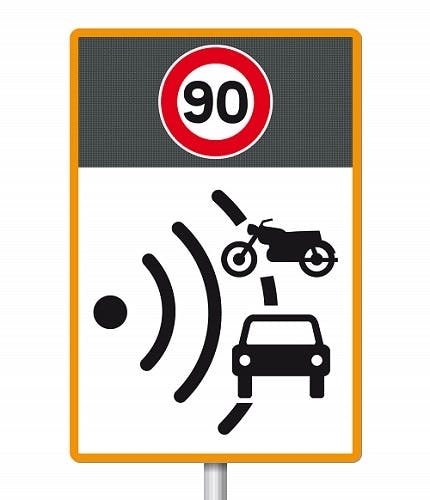
On secondary roads, speed limits change constantly. 110 (kph) to 80 to 50 to 90… You can be monitored anywhere, never know how much leeway a particular jurisdiction allows, and 2 weeks later, presto, an expensive violation appears in your mailbox — well, in my case it will be in Eric’s Spanish mailbox. These cameras aren’t coordinated. A careless day on the road could result in 5 or 10 violations. There’s some respite in that most radar cameras are announced by a sign a kilometer or so ahead, but there’s never a guarantee. But wait, there’s more! France deploys 3 other radar types along the roads including the worst of all: unmarked cars driven by civilian employees whose automated radar collects speeds and license plates all day long.
On this, my first long distance drive, with the first portion in the dark of night, I’m exceedingly careful to note all posted speed limits and camera warnings. I think I’m sliding through each one without garnering a ticket, but I just won’t know until Eric’s mailbox stays clear. The only time I exceed the limits by more than a few percent is when the surrounding traffic is speeding. I assume local drivers know the system, so when they suddenly slow up, so do I.
Much as I bridle at being subject to them, I think the US would be better off with traffic cameras, with the police confined to callouts and doughnut shops. In gun drenched America, fewer face-to-face police stops mean fewer innocent lives cut short by police bullets. In that regard, automated citations are well worth it — but I still hate them!
Sunrise comes at about 8 AM and my first reward is a beautiful view into the Tarn Valley as I descend to Millau, France.
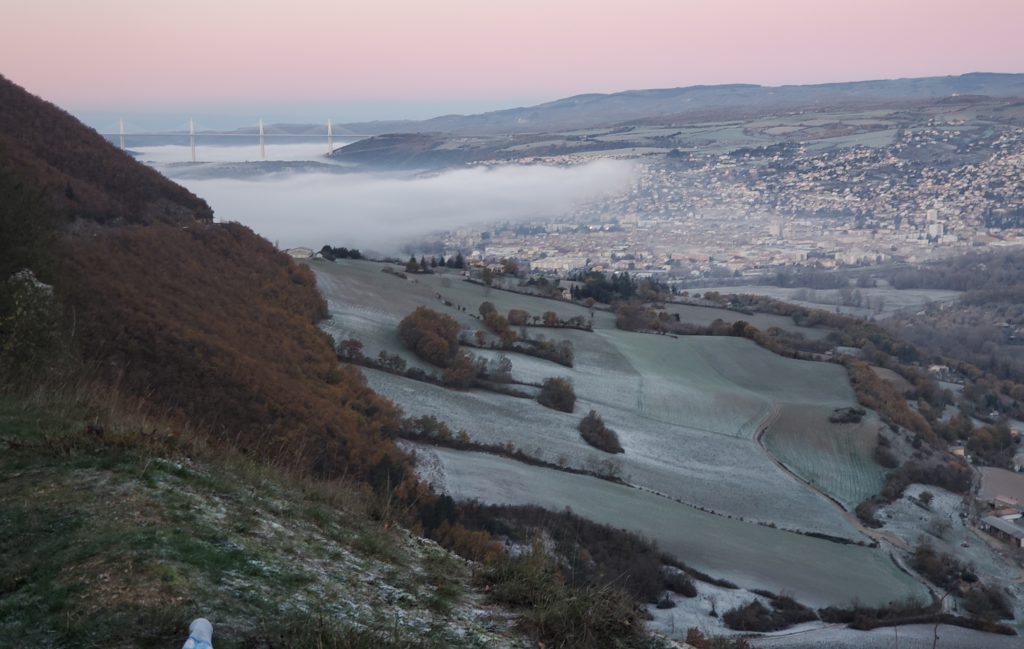
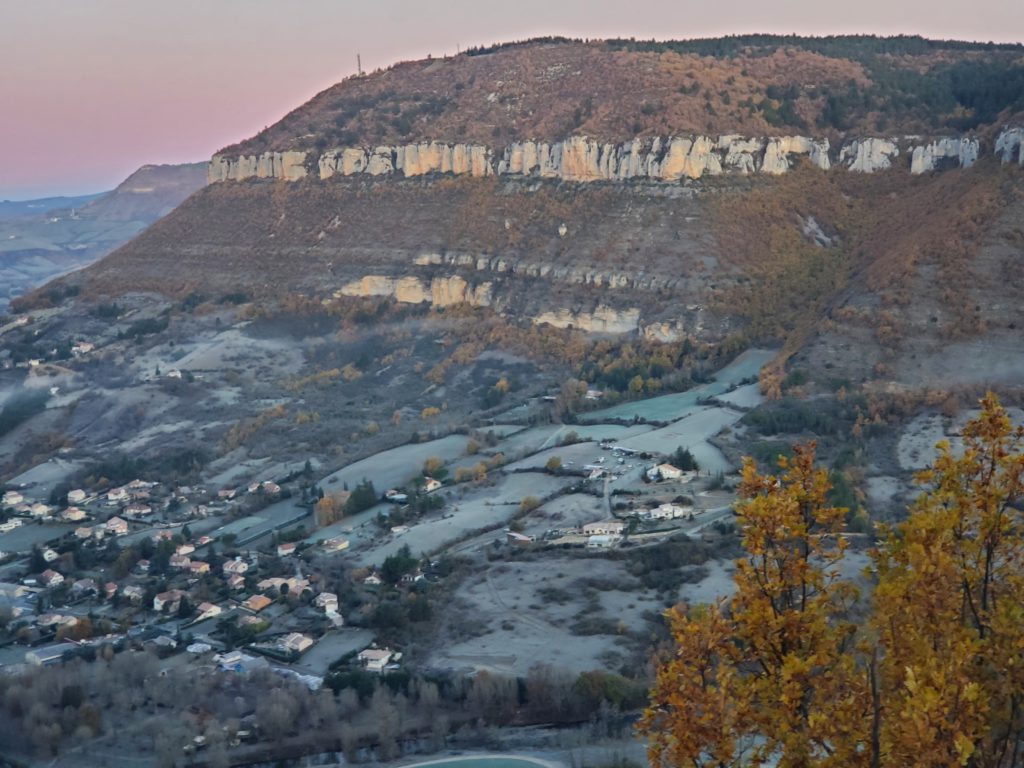
The next couple of hours are up and down through the Massif Central, an ancient volcanic area, with elevations to 1120 m (3700 ft) and temperatures down to -12 C (10 F). There’s quite a lot of snow cover in places but the roads are dry all the way.
Being in a French-speaking area is always a challenge for me because I’ve never been able to make any headway in the French language. I can deal with signs and such because many words are similar to English, Spanish, or Portuguese but my aural skills — always my weakest point in any language — totally fail me in French. I understand spoken language mainly by picturing the words in print in my head. That step is what keeps me from ever attaining true fluency in any language, but French is the worst. When French words are spoken, I simply can’t figure out how they would be written. My primitive attempts to ask a question often result in a frustrated, semi-polite, nasal, “Quoi?” (“What?”) Even if I get the question communicated, there’s almost no chance I’m going to understand the answer. It’s humiliating, so I’m happy to work my way north as wordlessly as possible. I’m hoping my host, Sophie, speaks adequate English. Thanks to online translation, you can never be sure whether someone actually speaks your language. With Google’s help, I can probably write a pretty fluent message in Kurdish.
I make steady progress, stopping once more for fuel. Midday, I’m looking for a working class (US$10) lunch menu but, unlike Spain, that doesn’t seem to exist in France. The best I can find is about US$28 so I settle for pastries. You can’t swing a dead cat in France without hitting a good patisserie.
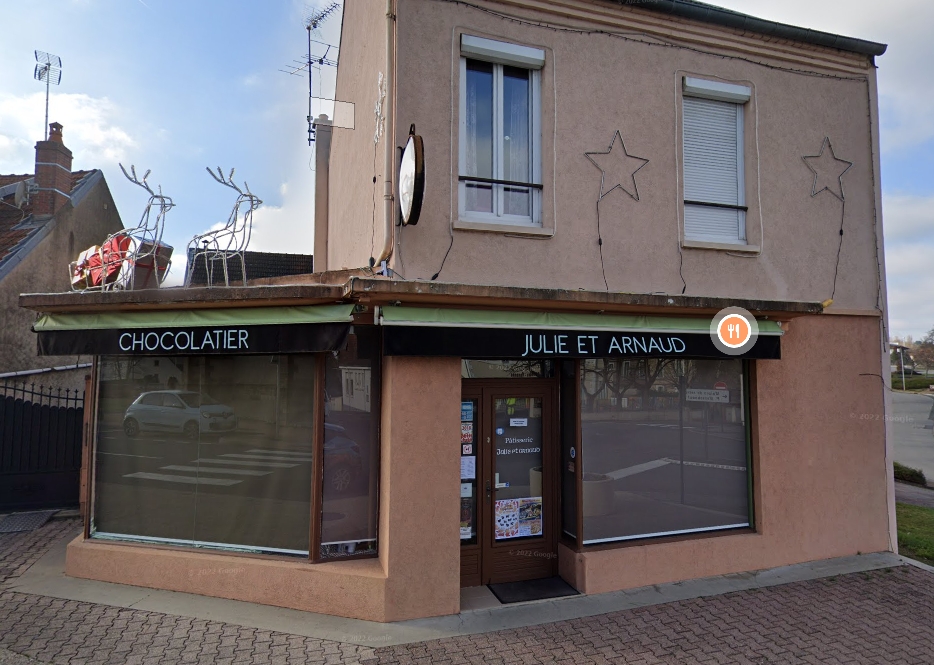
The Berlingo’s USB port is apparently made for accessing music rather than charging and my phone has been slowly losing charge even while plugged in. I’ll have to buy a cigarette lighter charger but for now I make a 30-minute stop at McDonalds to plug in to the wall. It would be quite inconvenient for my phone to go dead while I’m trying to find my host’s address this evening, in the dark. While I’m waiting, I order a large coffee from the menu but it doesn’t appear in the usual assembly line fashion. After a couple of wordless inquiries pointing to my receipt, I see a quick staff conference taking place. Then, a teenager with some school English conveys to me that they have no large coffee cups. Europeans almost always drink little expresso coffees and my order has messed up the system. The kid manages to say they’ll give me 2 medium coffees, which is fine with me.
I continue ambling northeast toward Riedisheim but I’m a little behind the needed pace for arrival as promised, so I hop on the toll road for the last 100 miles and zip along at over 80 mph to roll in on time at 6:15 PM. Sophie’s address is on a dark, dead end street. I see house numbers on the block, but not her #7. I ring the bell at #9 and the guy who eventually responds says he doesn’t know where #7 is. I text Sophie and she comes out to find me. It turns out #7 is right next door where it should be but, unlike all the private homes on the block, this is a large (unnumbered) multi-unit building.
I’m welcomed in by Sophie and Arnaud. It doesn’t take very long to find out they’re a new couple, only together about a month. Neither of them speaks fluent English. Arnaud’s is slightly better but anything I say has to be spoken slowly and simply. Within an hour, our conversation has gotten more involved, complex and intense, with frequent references to Google Translate when any of us can’t convey an idea. Eventually, all three of us are enthusiastically mis-speaking words in the other’s language.
The French seem to eat well almost effortlessly and Sophie and Arnaud serve up plenty of beer, wine, juice (for me), bread and cheese, and a delicious cheese and potato dish in the vein of baked brie or raclette — followed of course by more wine. Our conversation picks up speed as we trade histories, personal lives, family, my car buying adventure, etc. Sophie and Arnaud both smoke, so there are periodic breaks where they bundle up and we all go out on their back patio so they can light up homemade cigs in the freezing weather.
Sophie, 41, works for the city building permit department, leading to repeating jokes about her spending all day at work saying “No.” Despite (or, perhaps, indicated by) the presence of the younger boyfriend, she is pretty clearly a determined woman who plots her own destiny. She tells me she’s never been married and it’s her condo or rental (I don’t remember which). Sophie is definitely no shrinking violet — which is as it should be.
After a few hours of this, we break for the night. I’ve been on the road since 3 AM so I’m definitely bushed.
Sophie has to work in the morning but declares she will only stay a half day (how French!) so we can spend the remainder together. This leads to a jokey discussion about how the French aspire to a 4-hour work week. I get up pretty early but Arnaud doesn’t emerge until after 11 AM — NOT a morning person. I spend quite a lot of time enticing Sophie’s very playful black cat.
Sophie arrives home and we make a substantial lunch, with more beer and wine, naturally. After that, the conversation gradually turns to music. Arnaud is a musician and they are both fans of rock music. We end up spending hours of me finding lyrics in French to my favorite songs (so they’ll understand what is being sung) and then playing audio of them. Most of these were issued before they were born and I’m able to dredge up many which they really like but aren’t yet familiar with. One prime example is Bad Case of Lovin’ You, clearly one of the best rock & roll songs ever produced and one that MUST be played at full volume (although I’m not enamored of anything else Robert Palmer ever did). The evening gets pretty raucous with all of us belting out off key lyrics over the music.
As darkness falls, we bundle up and take a long walk around town in the evening fog. Sophie lives right at the end of a residential area so our walk encompasses farm land, weekend cabins and then downtown Riedisheim.
On return, we scrounge up some dinner, more wine, more beer. For dessert, Sophie pours tiny shot glasses of rum. In 24 hours, I consume about a year’s ration of alcohol, although that’s still not very much. Sophie and Arnaud are very amused when I tell them my son Eric says I “drink like a girl.”
As a new couple, Sophie and Arnaud tend to be all over each other, leading me to mirthfully teach them two new American phrases, “PDA” (public displays of affection) and “Hey, get a room!”
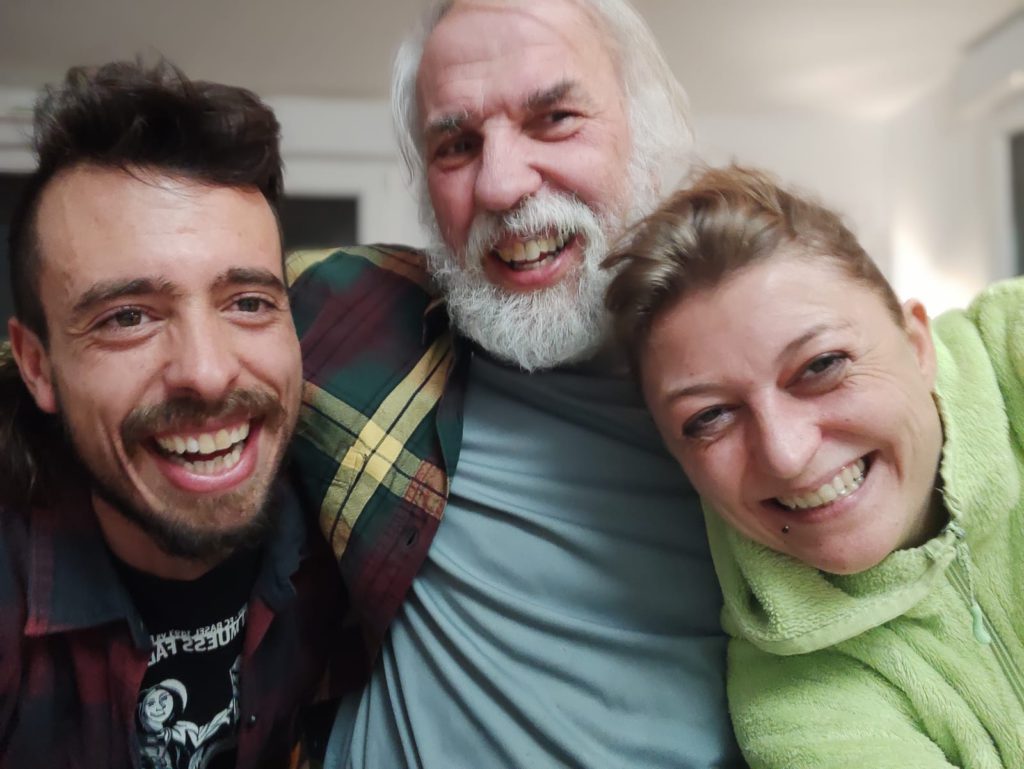
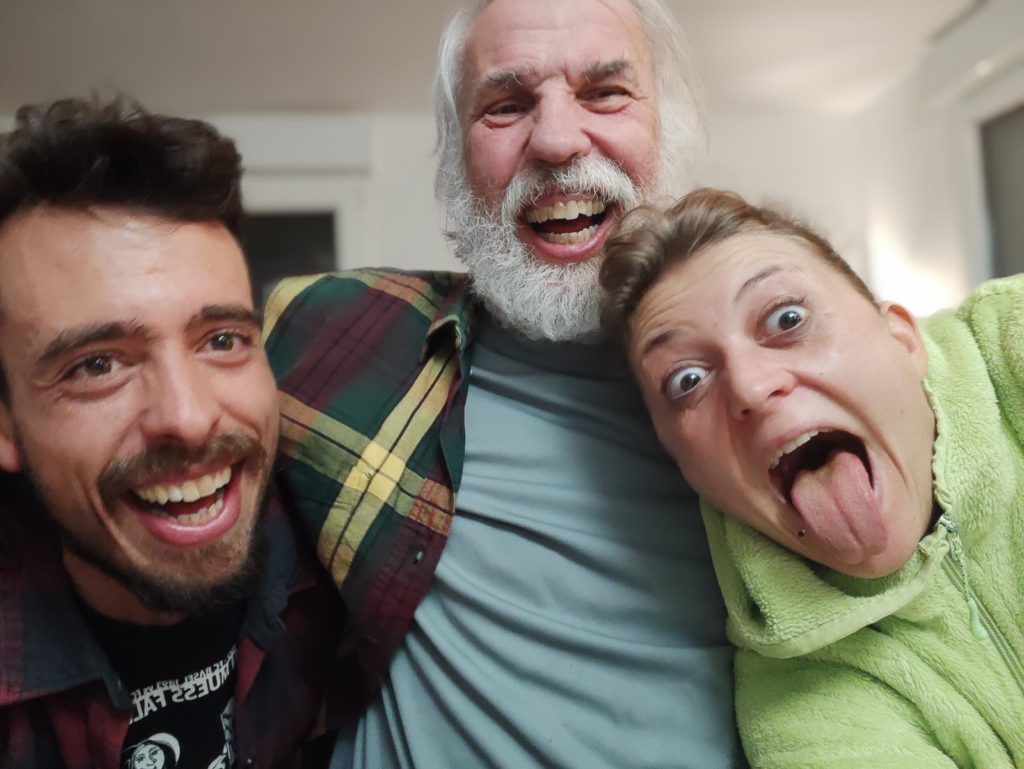
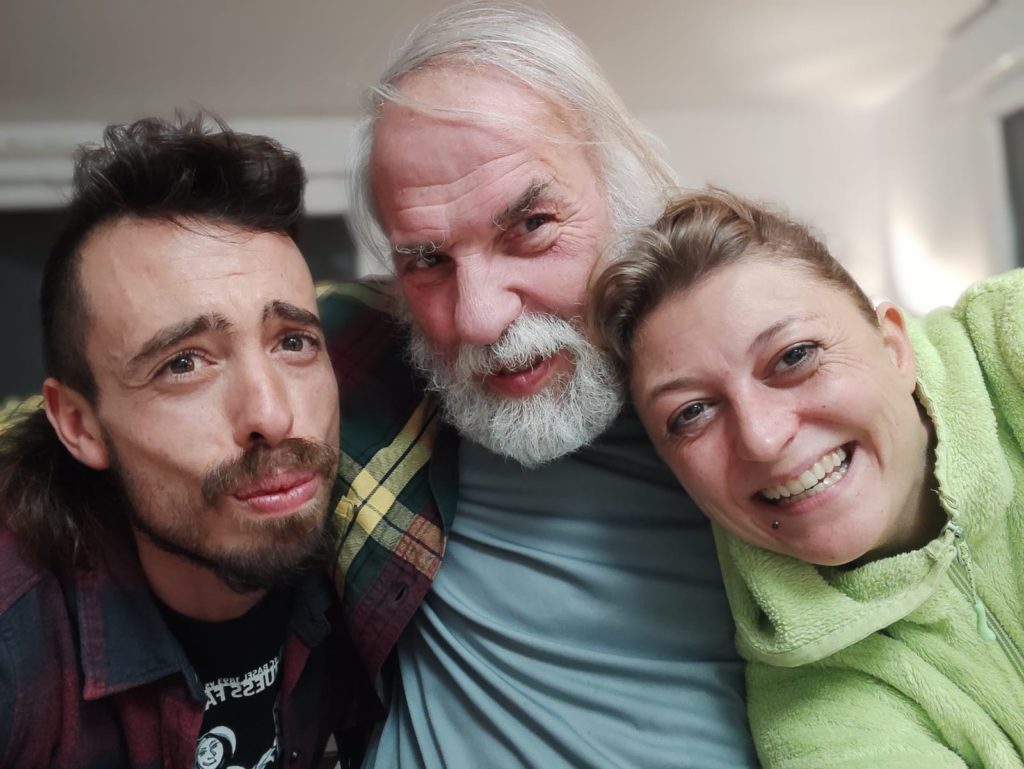
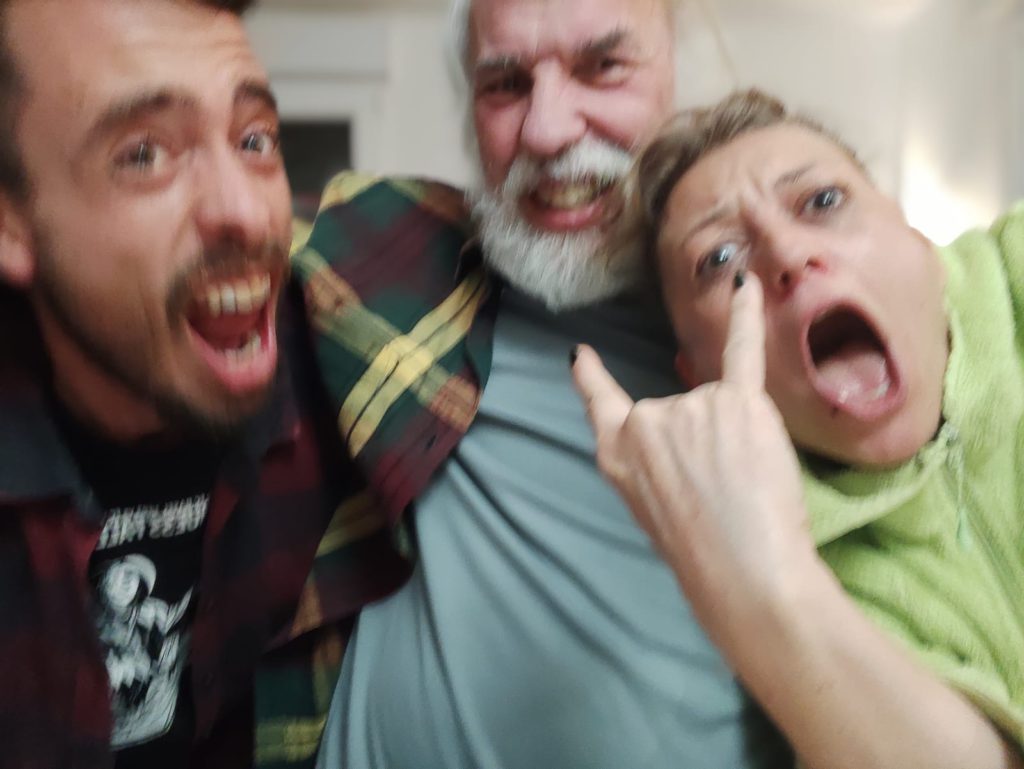
Strangers become crazy friends!
We finally call it a night, exhausted from all the laughing and translating. This kind of experience, where travelers are hosted by strangers without any exchange of money goes by the name hospitality exchange, or “hospex”. I’ve been doing this for over 40 years and, really, it’s the best part of travel — even though perhaps 98% of people will never even consider it. “Are you nuts? Have strangers stay in my house with me?” “Go to some strange town and sleep in a house belonging to someone I just met? They could be axe murderers!” For people who can’t or don’t want to travel, hosting hospex visitors brings the world into your living room.
These considerations keep wonderful person-to-person interactions a quiet privilege of a select few. The more both parties are willing to give and share, the more they get out of it. Many’s the time I’ve dived into someone’s kitchen, rattling among their pots and pans and spices to whip up a taco dinner for people who may never have had one. I could have zipped across France in my car, stayed in some roadside inn, never met Sophie and Arnaud, and left the country no less ignorant or more enriched than I entered it. All three of us would be the poorer for it. Instead, we’ve contributed in a small way to building one more peaceful bridge between dissimilar cultures.
As well, Servas visits and the like can make connections between generations that are all too rare outside of families. When do people in their 30s, 40s, and 70s share time together, get to know each other in a way that the large age differences melt away in a matter of hours?
The hurdle for most people is that hospitality between strangers means purposely making yourself vulnerable. That can lead to amazing experiences. Incidents of assault or theft are extremely rare. If they weren’t, networks like Servas, BeWelcome, CouchSurfing, and WamShowers would have fallen apart decades ago. Peaceful encounters and insights among strangers are desperately needed in our seriously troubled world.







